This School Does Not Exist
If you want to see the future you have to go to the edges. Welcome to Future School.

Concept Development
2019


Welcome to 2050
In the decades since 2020, we've witnessed intelligent technologies democratise access to high-quality information, data, and tools with shape shifting implications for learning, research and the way we think about education. Which leads us to some of the most important questions - how do we support students to develop the right expertise in 2050? What are the skills most useful for the world of work and which are no longer necessary? What should we aim for and how will we know when our students reach it? How will we help our students to separate the signal from the noise?
These are the questions we seek to answer through our Future.School learning program.

Our learning model at Future.School is based on the T -shaped skill approach.
The democratisation of access and opportunity via new technologies has reshaped the role of education and the knowledge & skill objectives that drive our curriculum.
We believe a broad education and the ability to navigate, understand and synthesise multiple areas of knowledge has never been more important. However we believe it is most fruitful and enables our students to most generously contribute to the world, when it is paired with a deep skill, intense interest, passion or purpose in one particular field.
Furthermore, given the increasing advances of AI and the rapid development of semantic language intelligence systems which are both linear and non-linear in nature, we believe the real opportunity for our students to contribute in their future work lies in the spaces between. We focus on the development of non-sequential thinking skills and nurture the ability / curiosity students need to make unexpected connections.

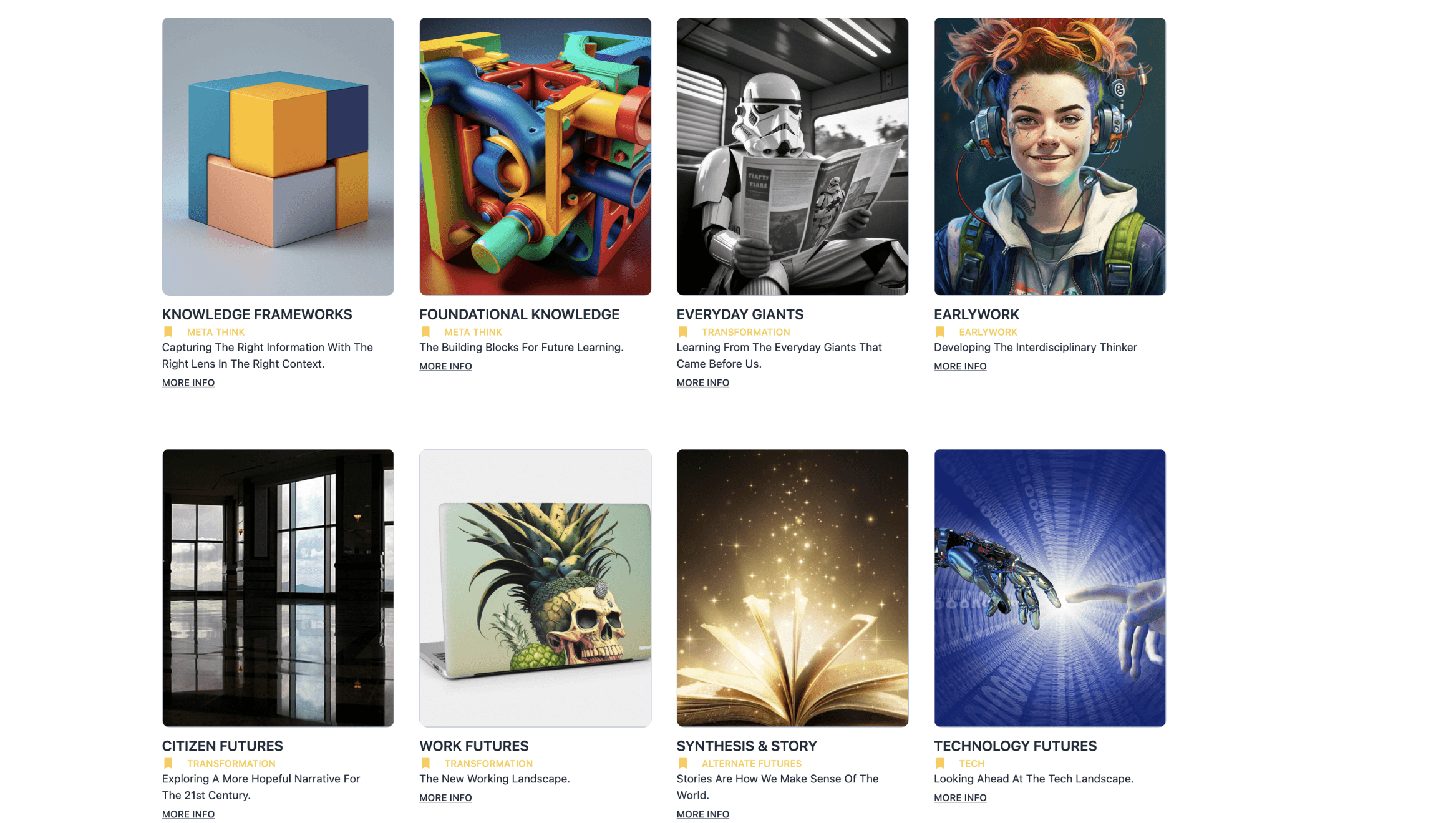
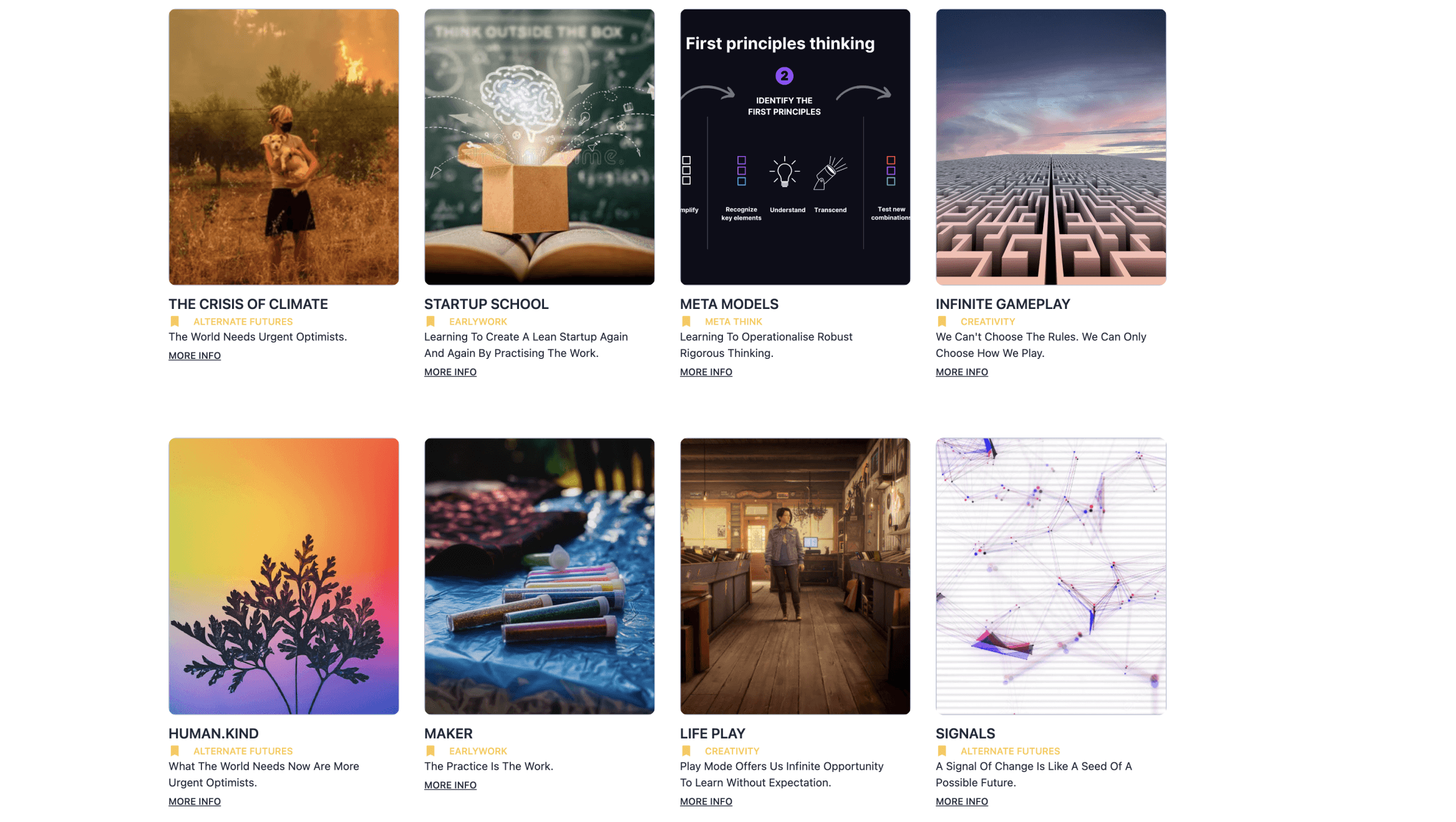



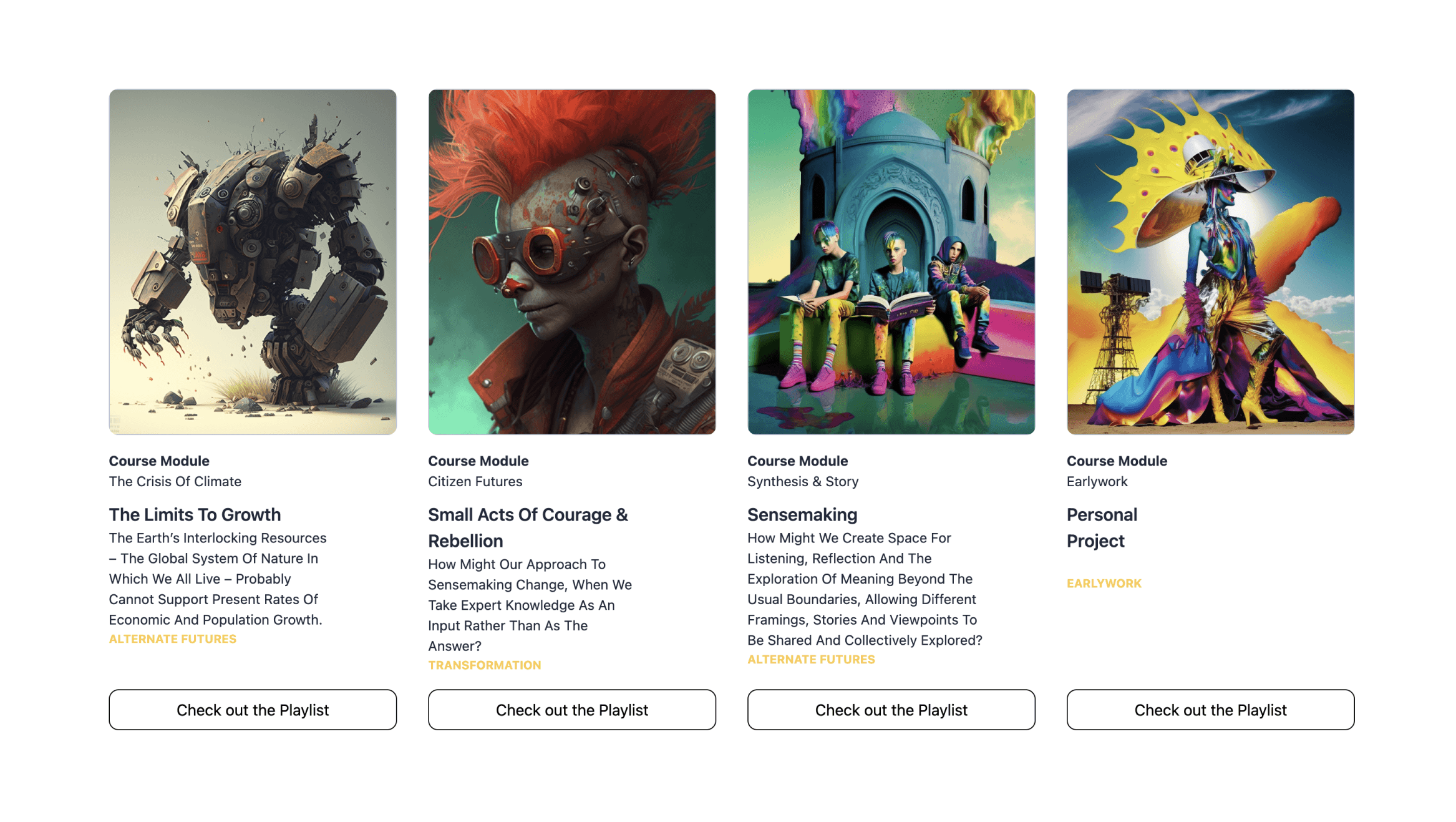
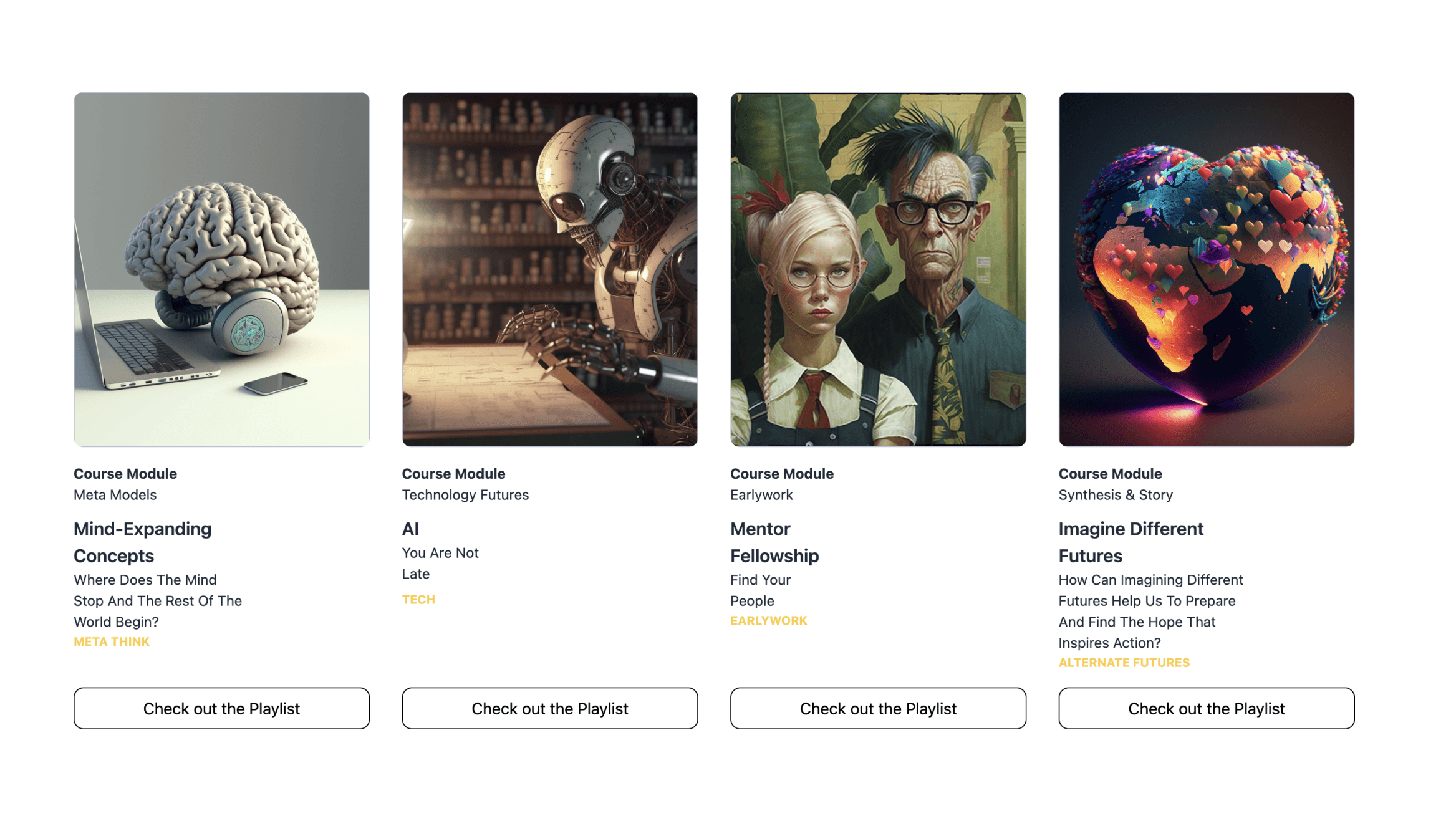

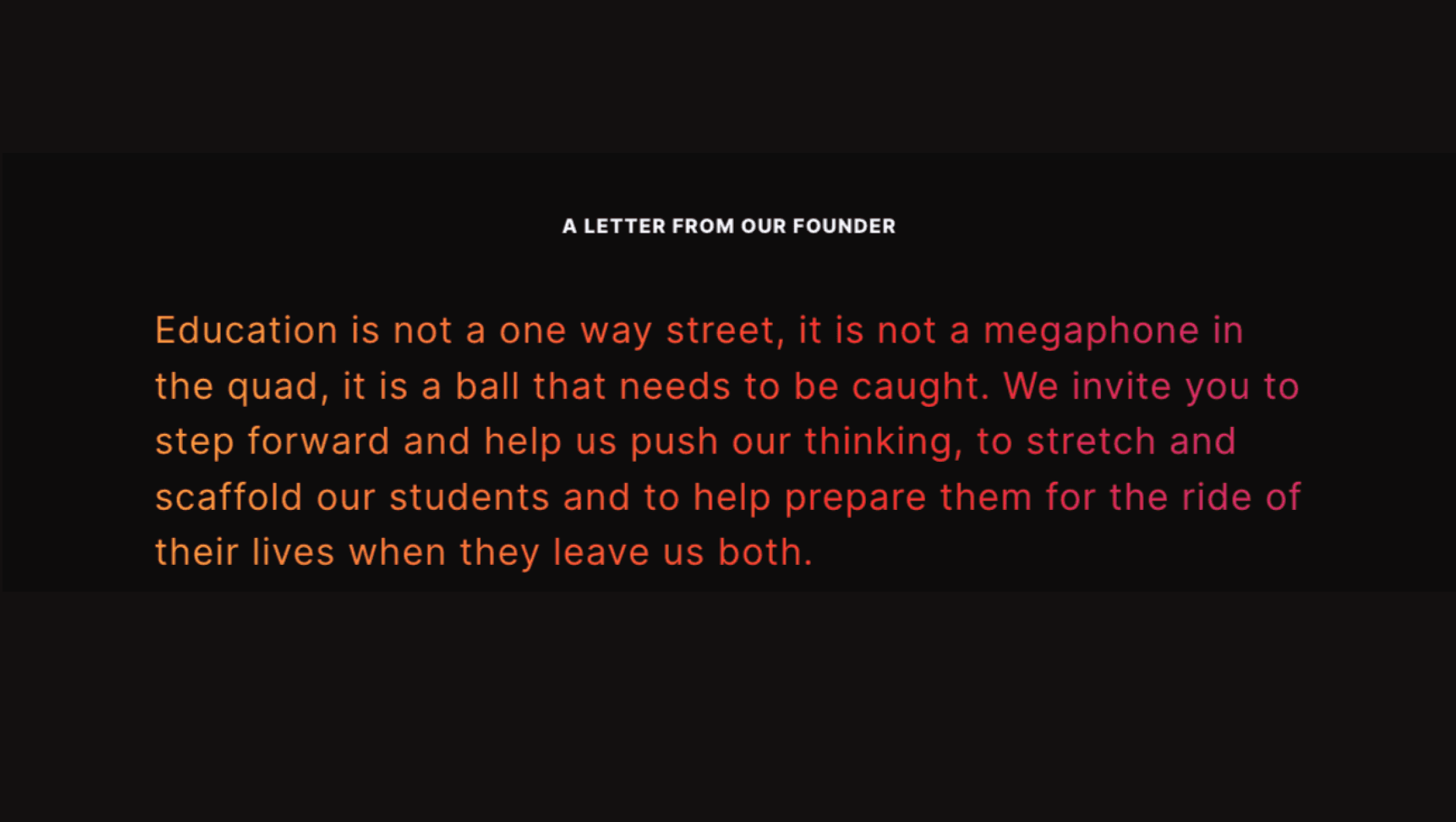
In the past when we talked about education and especially about education technologies, the conversation tended to focus on information delivery, not teaching itself. Too few people inside and outside the education sector talked about what makes a great teacher and what makes great teaching. When people talked about curriculum, they tended to focus on content or up-skilling, over subject matter expertise.
Two years after the Government passed the Education Innovation Reform Act in 2032, allowing each school to develop and teach through their own learning models - we opened our doors for the very first time. We had been developing the model for future school through the FutureSchoolDAO for many years with educators both here and overseas. We had been preparing for the possibility that one day, Governments might create the space for education itself to grow and learn and evolve, just as we have been creating that same space for our students.
In the old days, education was about us having all the answers. But in today’s dynamic, we believe it’s about asking the right questions and taking the right posture, to create a scaffolded space for learning. We are unashamedly a work-in-progress school. As an education team we constantly ask ourselves - which parts of the education process should be tight and defined and more permanent, and which parts should be loose. In those areas where we believe change is not only necessary but inevitable, we are always in beta mode.
Whilst our subject structure and teaching frameworks have been developed over many years, you’ll find we try things regularly and not everything works all the time. It also means we need your feedback. Education is not a one way street, it is not a megaphone in the quad, it is a ball that needs to be caught. So we welcome your feedback and invite you to step forward and help us continue to push our thinking, to stretch and scaffold our students and to help prepare them for the ride of their lives when they leave us both.
Sometimes it's a bumpy ride; but we will iterate and we will learn things. Sometimes things will break and we’ll fix them, and we’ll get better. But we will always be learning and we will always be looking forward.
That's our commitment to you
Best,
Zyre Nova
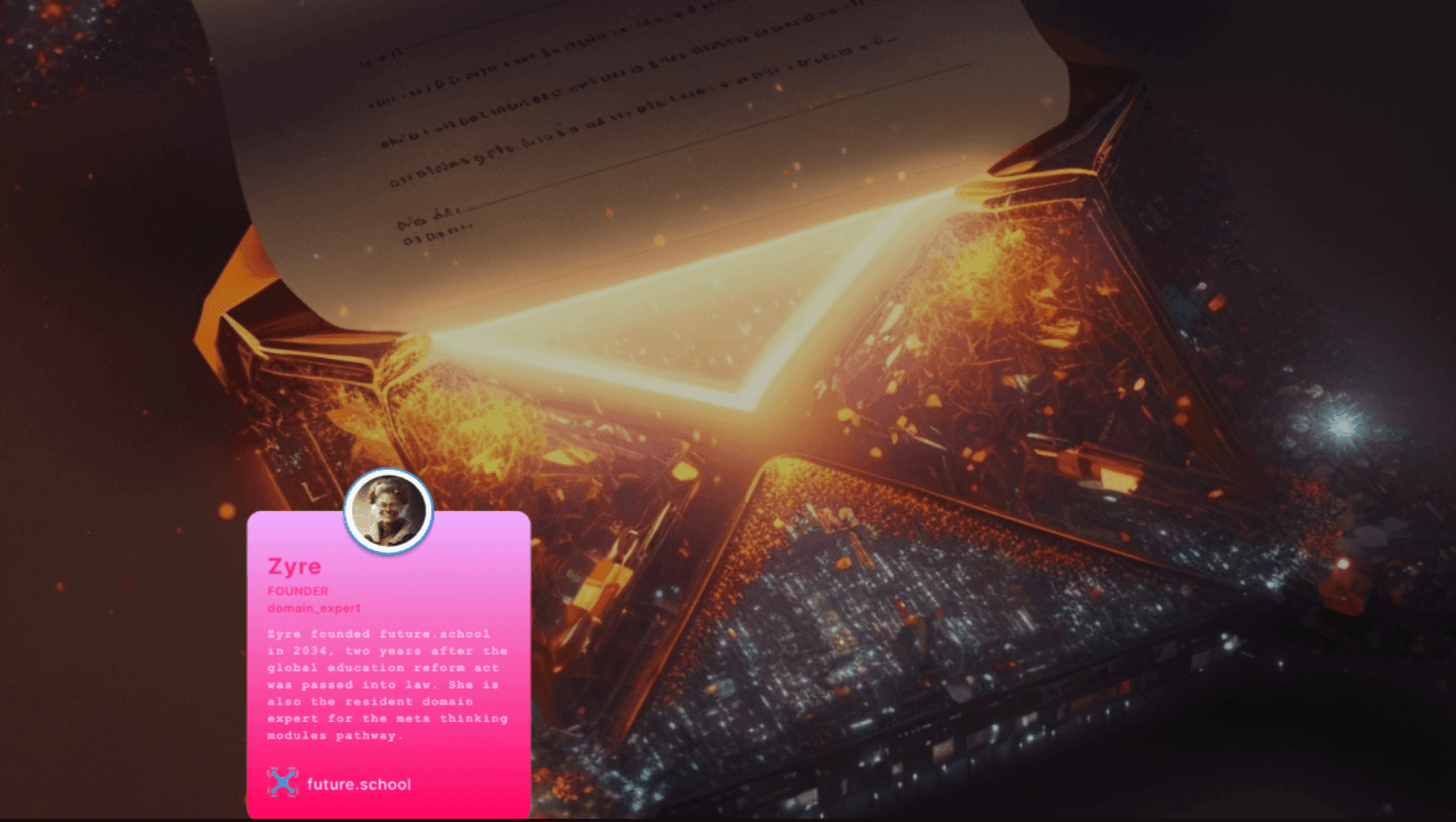
Welcome to 2050
In the decades since 2020, we've witnessed intelligent technologies democratise access to high-quality information, data, and tools with shape shifting implications for learning, research and the way we think about education. Which leads us to some of the most important questions - how do we support students to develop the right expertise in 2050? What are the skills most useful for the world of work and which are no longer necessary? What should we aim for and how will we know when our students reach it? How will we help our students to separate the signal from the noise?
These are the questions we seek to answer through our Future.School learning program.

Our learning model at Future.School is based on the T -shaped skill approach.
The democratisation of access and opportunity via new technologies has reshaped the role of education and the knowledge & skill objectives that drive our curriculum.
We believe a broad education and the ability to navigate, understand and synthesise multiple areas of knowledge has never been more important. However we believe it is most fruitful and enables our students to most generously contribute to the world, when it is paired with a deep skill, intense interest, passion or purpose in one particular field.
Furthermore, given the increasing advances of AI and the rapid development of semantic language intelligence systems which are both linear and non-linear in nature, we believe the real opportunity for our students to contribute in their future work lies in the spaces between. We focus on the development of non-sequential thinking skills and nurture the ability / curiosity students need to make unexpected connections.










In the past when we talked about education and especially about education technologies, the conversation tended to focus on information delivery, not teaching itself. Too few people inside and outside the education sector talked about what makes a great teacher and what makes great teaching. When people talked about curriculum, they tended to focus on content or up-skilling, over subject matter expertise.
Two years after the Government passed the Education Innovation Reform Act in 2032, allowing each school to develop and teach through their own learning models - we opened our doors for the very first time. We had been developing the model for future school through the FutureSchoolDAO for many years with educators both here and overseas. We had been preparing for the possibility that one day, Governments might create the space for education itself to grow and learn and evolve, just as we have been creating that same space for our students.
In the old days, education was about us having all the answers. But in today’s dynamic, we believe it’s about asking the right questions and taking the right posture, to create a scaffolded space for learning. We are unashamedly a work-in-progress school. As an education team we constantly ask ourselves - which parts of the education process should be tight and defined and more permanent, and which parts should be loose. In those areas where we believe change is not only necessary but inevitable, we are always in beta mode.
Whilst our subject structure and teaching frameworks have been developed over many years, you’ll find we try things regularly and not everything works all the time. It also means we need your feedback. Education is not a one way street, it is not a megaphone in the quad, it is a ball that needs to be caught. So we welcome your feedback and invite you to step forward and help us continue to push our thinking, to stretch and scaffold our students and to help prepare them for the ride of their lives when they leave us both.
Sometimes it's a bumpy ride; but we will iterate and we will learn things. Sometimes things will break and we’ll fix them, and we’ll get better. But we will always be learning and we will always be looking forward.
That's our commitment to you
Best,
Zyre Nova

Welcome to 2050
In the decades since 2020, we've witnessed intelligent technologies democratise access to high-quality information, data, and tools with shape shifting implications for learning, research and the way we think about education. Which leads us to some of the most important questions - how do we support students to develop the right expertise in 2050? What are the skills most useful for the world of work and which are no longer necessary? What should we aim for and how will we know when our students reach it? How will we help our students to separate the signal from the noise?
These are the questions we seek to answer through our Future.School learning program.

Our learning model at Future.School is based on the T -shaped skill approach.
The democratisation of access and opportunity via new technologies has reshaped the role of education and the knowledge & skill objectives that drive our curriculum.
We believe a broad education and the ability to navigate, understand and synthesise multiple areas of knowledge has never been more important. However we believe it is most fruitful and enables our students to most generously contribute to the world, when it is paired with a deep skill, intense interest, passion or purpose in one particular field.
Furthermore, given the increasing advances of AI and the rapid development of semantic language intelligence systems which are both linear and non-linear in nature, we believe the real opportunity for our students to contribute in their future work lies in the spaces between. We focus on the development of non-sequential thinking skills and nurture the ability / curiosity students need to make unexpected connections.










In the past when we talked about education and especially about education technologies, the conversation tended to focus on information delivery, not teaching itself. Too few people inside and outside the education sector talked about what makes a great teacher and what makes great teaching. When people talked about curriculum, they tended to focus on content or up-skilling, over subject matter expertise.
Two years after the Government passed the Education Innovation Reform Act in 2032, allowing each school to develop and teach through their own learning models - we opened our doors for the very first time. We had been developing the model for future school through the FutureSchoolDAO for many years with educators both here and overseas. We had been preparing for the possibility that one day, Governments might create the space for education itself to grow and learn and evolve, just as we have been creating that same space for our students.
In the old days, education was about us having all the answers. But in today’s dynamic, we believe it’s about asking the right questions and taking the right posture, to create a scaffolded space for learning. We are unashamedly a work-in-progress school. As an education team we constantly ask ourselves - which parts of the education process should be tight and defined and more permanent, and which parts should be loose. In those areas where we believe change is not only necessary but inevitable, we are always in beta mode.
Whilst our subject structure and teaching frameworks have been developed over many years, you’ll find we try things regularly and not everything works all the time. It also means we need your feedback. Education is not a one way street, it is not a megaphone in the quad, it is a ball that needs to be caught. So we welcome your feedback and invite you to step forward and help us continue to push our thinking, to stretch and scaffold our students and to help prepare them for the ride of their lives when they leave us both.
Sometimes it's a bumpy ride; but we will iterate and we will learn things. Sometimes things will break and we’ll fix them, and we’ll get better. But we will always be learning and we will always be looking forward.
That's our commitment to you
Best,
Zyre Nova

Welcome to 2050
In the decades since 2020, we've witnessed intelligent technologies democratise access to high-quality information, data, and tools with shape shifting implications for learning, research and the way we think about education. Which leads us to some of the most important questions - how do we support students to develop the right expertise in 2050? What are the skills most useful for the world of work and which are no longer necessary? What should we aim for and how will we know when our students reach it? How will we help our students to separate the signal from the noise?
These are the questions we seek to answer through our Future.School learning program.

Our learning model at Future.School is based on the T -shaped skill approach.
The democratisation of access and opportunity via new technologies has reshaped the role of education and the knowledge & skill objectives that drive our curriculum.
We believe a broad education and the ability to navigate, understand and synthesise multiple areas of knowledge has never been more important. However we believe it is most fruitful and enables our students to most generously contribute to the world, when it is paired with a deep skill, intense interest, passion or purpose in one particular field.
Furthermore, given the increasing advances of AI and the rapid development of semantic language intelligence systems which are both linear and non-linear in nature, we believe the real opportunity for our students to contribute in their future work lies in the spaces between. We focus on the development of non-sequential thinking skills and nurture the ability / curiosity students need to make unexpected connections.










In the past when we talked about education and especially about education technologies, the conversation tended to focus on information delivery, not teaching itself. Too few people inside and outside the education sector talked about what makes a great teacher and what makes great teaching. When people talked about curriculum, they tended to focus on content or up-skilling, over subject matter expertise.
Two years after the Government passed the Education Innovation Reform Act in 2032, allowing each school to develop and teach through their own learning models - we opened our doors for the very first time. We had been developing the model for future school through the FutureSchoolDAO for many years with educators both here and overseas. We had been preparing for the possibility that one day, Governments might create the space for education itself to grow and learn and evolve, just as we have been creating that same space for our students.
In the old days, education was about us having all the answers. But in today’s dynamic, we believe it’s about asking the right questions and taking the right posture, to create a scaffolded space for learning. We are unashamedly a work-in-progress school. As an education team we constantly ask ourselves - which parts of the education process should be tight and defined and more permanent, and which parts should be loose. In those areas where we believe change is not only necessary but inevitable, we are always in beta mode.
Whilst our subject structure and teaching frameworks have been developed over many years, you’ll find we try things regularly and not everything works all the time. It also means we need your feedback. Education is not a one way street, it is not a megaphone in the quad, it is a ball that needs to be caught. So we welcome your feedback and invite you to step forward and help us continue to push our thinking, to stretch and scaffold our students and to help prepare them for the ride of their lives when they leave us both.
Sometimes it's a bumpy ride; but we will iterate and we will learn things. Sometimes things will break and we’ll fix them, and we’ll get better. But we will always be learning and we will always be looking forward.
That's our commitment to you
Best,
Zyre Nova

Welcome to 2050
In the decades since 2020, we've witnessed intelligent technologies democratise access to high-quality information, data, and tools with shape shifting implications for learning, research and the way we think about education. Which leads us to some of the most important questions - how do we support students to develop the right expertise in 2050? What are the skills most useful for the world of work and which are no longer necessary? What should we aim for and how will we know when our students reach it? How will we help our students to separate the signal from the noise?
These are the questions we seek to answer through our Future.School learning program.

Our learning model at Future.School is based on the T -shaped skill approach.
The democratisation of access and opportunity via new technologies has reshaped the role of education and the knowledge & skill objectives that drive our curriculum.
We believe a broad education and the ability to navigate, understand and synthesise multiple areas of knowledge has never been more important. However we believe it is most fruitful and enables our students to most generously contribute to the world, when it is paired with a deep skill, intense interest, passion or purpose in one particular field.
Furthermore, given the increasing advances of AI and the rapid development of semantic language intelligence systems which are both linear and non-linear in nature, we believe the real opportunity for our students to contribute in their future work lies in the spaces between. We focus on the development of non-sequential thinking skills and nurture the ability / curiosity students need to make unexpected connections.










In the past when we talked about education and especially about education technologies, the conversation tended to focus on information delivery, not teaching itself. Too few people inside and outside the education sector talked about what makes a great teacher and what makes great teaching. When people talked about curriculum, they tended to focus on content or up-skilling, over subject matter expertise.
Two years after the Government passed the Education Innovation Reform Act in 2032, allowing each school to develop and teach through their own learning models - we opened our doors for the very first time. We had been developing the model for future school through the FutureSchoolDAO for many years with educators both here and overseas. We had been preparing for the possibility that one day, Governments might create the space for education itself to grow and learn and evolve, just as we have been creating that same space for our students.
In the old days, education was about us having all the answers. But in today’s dynamic, we believe it’s about asking the right questions and taking the right posture, to create a scaffolded space for learning. We are unashamedly a work-in-progress school. As an education team we constantly ask ourselves - which parts of the education process should be tight and defined and more permanent, and which parts should be loose. In those areas where we believe change is not only necessary but inevitable, we are always in beta mode.
Whilst our subject structure and teaching frameworks have been developed over many years, you’ll find we try things regularly and not everything works all the time. It also means we need your feedback. Education is not a one way street, it is not a megaphone in the quad, it is a ball that needs to be caught. So we welcome your feedback and invite you to step forward and help us continue to push our thinking, to stretch and scaffold our students and to help prepare them for the ride of their lives when they leave us both.
Sometimes it's a bumpy ride; but we will iterate and we will learn things. Sometimes things will break and we’ll fix them, and we’ll get better. But we will always be learning and we will always be looking forward.
That's our commitment to you
Best,
Zyre Nova

Tags
Education Futures, Future School, Future Concept,
⚒️ | Framer | Figma | Midjourney
You might also like
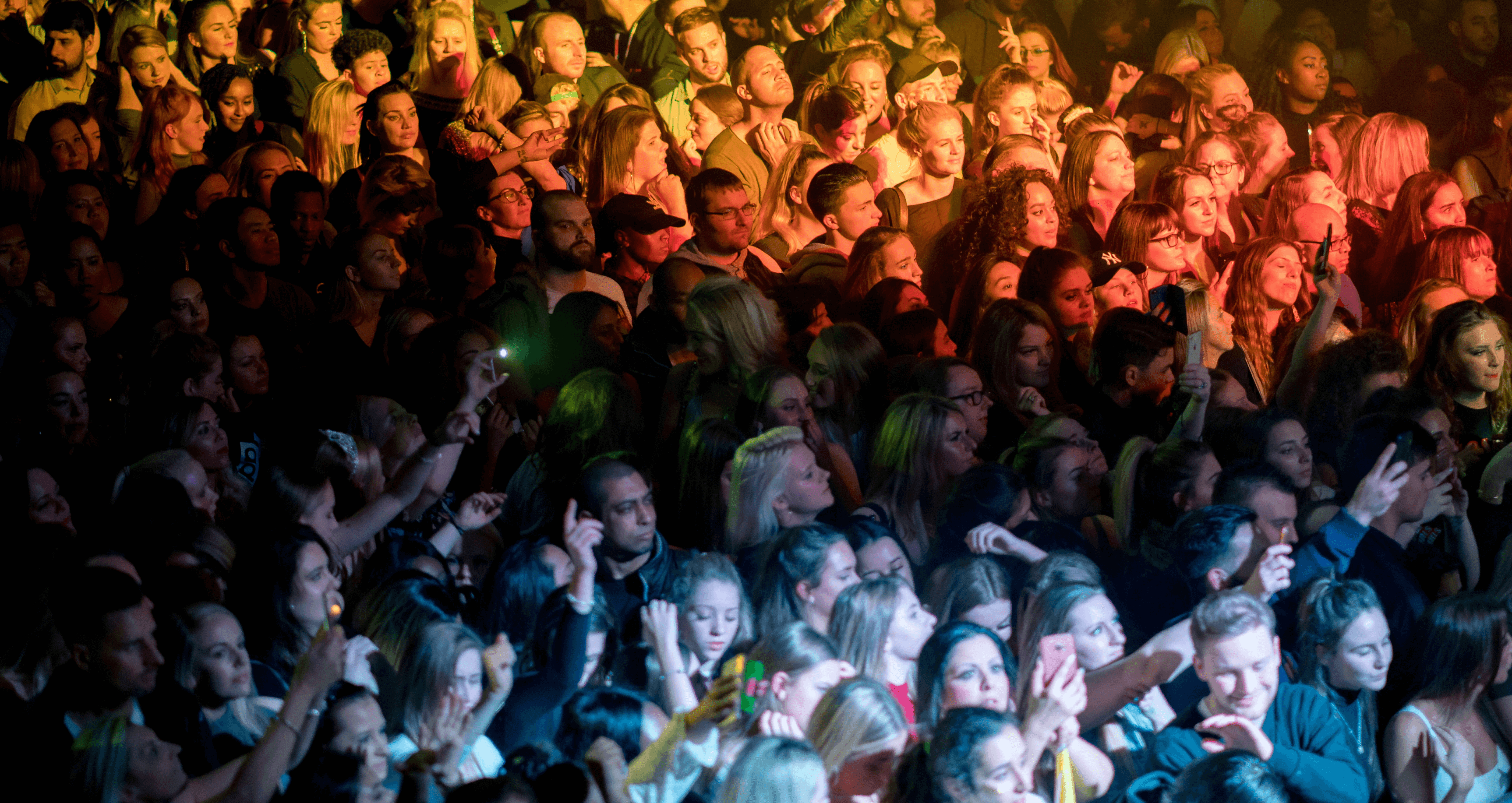
Political Notion
Information Architecture

Political Notion
Information Architecture
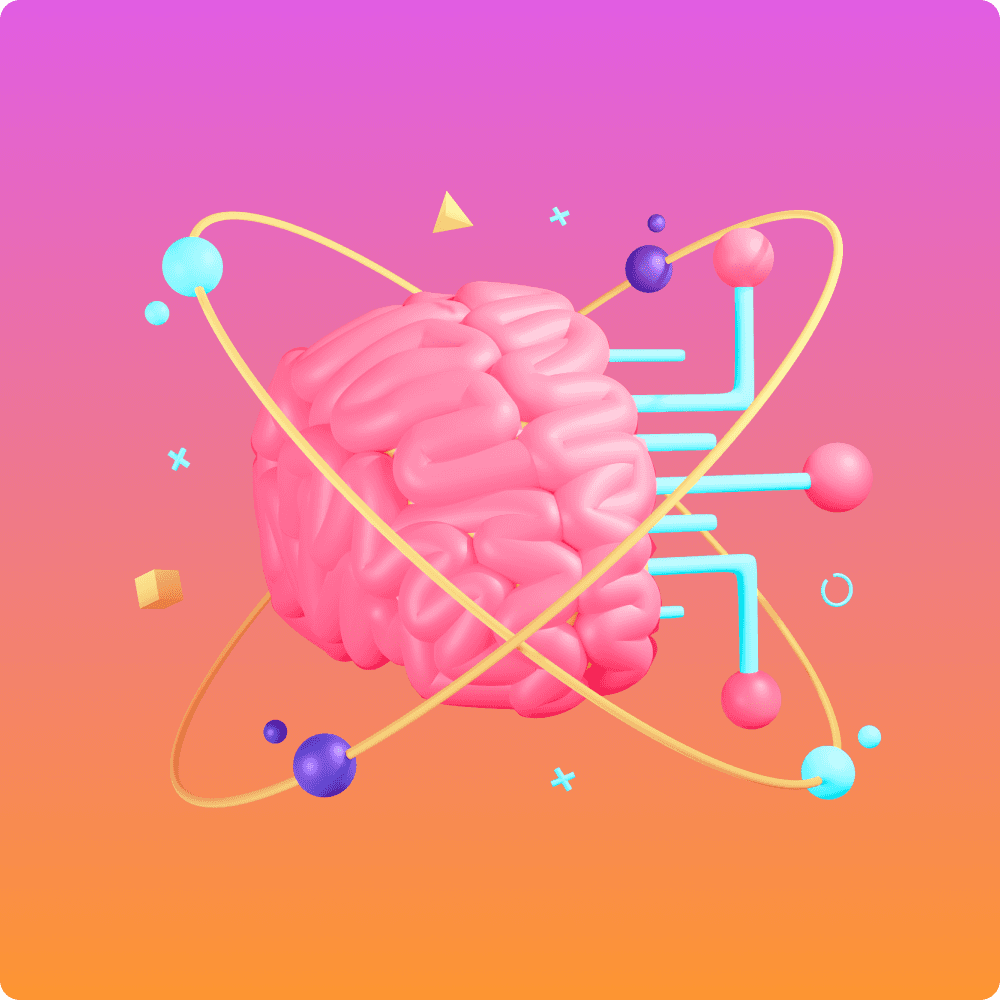
Neurodiversity Resources
Concept Development

Neurodiversity Resources
Concept Development
🛠️ Tools + Resources